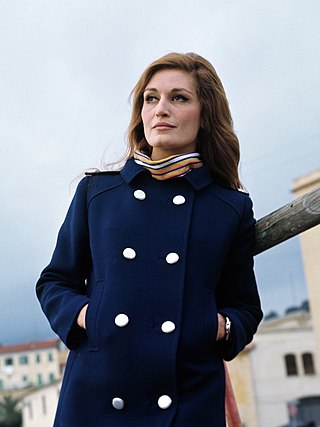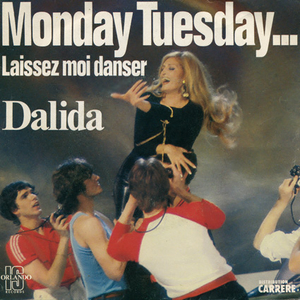
Iolanda Cristina Gigliotti, professionally known as Dalida, was a French singer and actress, born in Egypt to Italian parents. Leading an international career, Dalida sold several million records around the world. Her best known songs are "Bambino", "Gondolier", "Les enfants du Pirée", "Le temps des fleurs", "Darla dirladada", "J'attendrai", "Le jour où la pluie viendra", "Gigi l'amoroso", "Salama ya salama", and "Paroles, paroles" featuring spoken word by Alain Delon.

Gilles Vigneault is a Canadian poet, publisher, singer-songwriter, and Quebec nationalist and sovereigntist. Two of his songs are considered by many to be Quebec's unofficial anthems: "Mon pays" and "Gens du pays", and his line Mon pays ce n'est pas un pays, c'est l'hiver became a proverb in Quebec. Vigneault is a Grand Officer of the National Order of Quebec, Knight of the Legion of Honour, and Officer of the Ordre des Arts et des Lettres.

"Monday Tuesday... Laissez moi danser" is a 1979-released disco single by French recording artist Dalida. It was a number one hit and the biggest success of the disco period in France.

Tendrement is the second album by French pop singer Lorie. It originally came out on 16 September 2002 in a regular jewel case version and a limited edition cardboard box containing the CD in a digipak and eight postcards featuring the famous blond singer. On 2 December 2002, a limited Christmas edition of the album was released, in digipak form, with extra tracks and a DVD... but no more postcards. Finally, on 2 June 2003, the regular jewel case was re-released to include the hit single "Sur un air latino". As of 20 September 2004, this version can be bought jointly with the singer's debut album, Près de Toi.

Olympia 67 is the first album released by Dalida after her suicide attempt and her 1967 comeback performance at the Olympia. Among the tracks on the album are "À qui?", "Je reviens te chercher", "La banda", "Mama", "Ciao amore, ciao", "Les grilles de ma maison" and "Petit homme".
Jeane Manson is an American model, singer, and actor, born in Cleveland, Ohio. Her first name was changed from "Jean" to "Jeane" because, as all of her career was in France after 1974, the French would have otherwise thought that she was a man, "Jean" being the French for "John".
"Parlez-moi d'amour" is a song written by Jean Lenoir in 1930. An English translation was written by Bruce Sievier and is known as "Speak to Me of Love" or "Tell Me About Love". Lucienne Boyer was the first singer to record the song, and she made it very popular in France, America, and the rest of the world.
"Fascination" is a popular waltz song with music (1904) by Fermo Dante Marchetti and lyrics (1905) by Maurice de Féraudy.
"Why" is a hit song recorded by Frankie Avalon in 1959. It reached No. 1 on the U.S. Billboard Hot 100 chart published on the week of December 28, 1959. It was Avalon's second and final No. 1 hit.

"Parlez-vous français ?" is a song recorded by Spanish disco duo Baccara, written by Rolf Soja, Frank Dostal and Peter Zentner. It is best known as the Luxembourgian entry at the Eurovision Song Contest 1978, held in Paris.

Raymond Berthiaume was a Canadian jazz singer, musician, producer and composer from Quebec, Canada.
Nicole Croisille is a French singer and actress. She has appeared in 24 films between 1961 and 2005, and recorded several albums since 1961.

Comment te dire adieu is the ninth studio album by French singer-songwriter Françoise Hardy, released in 1968 on Disques Vogue. Like many of her previous records, it was originally released without a title and came to be referred to, later on, by the name of its most popular song. The cover artwork was a drawing by Jean-Paul Goude.
Hollywood Girls : Une nouvelle vie en Californie, or simply Hollywood Girls, is a French soap opera created by Alexandre dos Santos, Jérémy Michalak, and Thibaut Vales for NRJ12. The series features an ensemble cast and follows a groups of French peoples who decided to start a new life in California, but their life is quickly disrupted by the diabolical Geny G and her husband, the Dr. David Moretti.
Georges Poubennec, better known under the name Georges Aber, was a French singer-songwriter.

Alice Donadel, stagename Alice Dona is a French singer and songwriter. Born to an Italian father from Veneto and a French mother, both musicians.

"Non illuderti mai" is a song by Italian singer Orietta Berti, released as a single in April 1968 for the summer festival Un disco per l'estate. The song came in second place at the festival behind "Luglio" by Riccardo Del Turco. It has notably been covered in English as "My Little Lady" by the Tremeloes and in French as "Ma bonne étoile" by Joe Dassin.

Love in Portofino is the sixth and last studio album of 1950s by French singer Dalida. It was released in December 1959 through Barclay Records.











